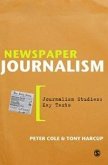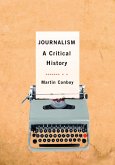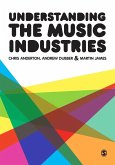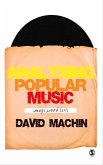That rare thing, an academic study of music that seeks to tie together the strands of the musical text, the industry that produces it, and the audience that gives it meaning... A vital read for anyone interested in the changing nature of popular music production and consumption"
- Dr Nathan Wiseman-Trowse, The University of Northampton
Popular music entertains, inspires and even empowers, but where did it come from, how is it made, what does it mean, and how does it eventually reach our ears?
Tim Wall guides students through the many ways we can analyse music and the music industries, highlighting crucial skills and useful research tips.
Taking into account recent changes and developments in the industry, this book outlines the key concepts, offers fresh perspectives and encourages readers to reflect on their own work. Written with clarity, flair and enthusiasm, it covers:
Students' learning is consolidated through a set of insightful case studies, engaging activities and helpful suggestions for further reading.
- Dr Nathan Wiseman-Trowse, The University of Northampton
Popular music entertains, inspires and even empowers, but where did it come from, how is it made, what does it mean, and how does it eventually reach our ears?
Tim Wall guides students through the many ways we can analyse music and the music industries, highlighting crucial skills and useful research tips.
Taking into account recent changes and developments in the industry, this book outlines the key concepts, offers fresh perspectives and encourages readers to reflect on their own work. Written with clarity, flair and enthusiasm, it covers:
- Histories of popular music, their traditions and cultural, social, economic and technical factors
- Industries and institutions, production, new technology, and the entertainment media
- Musical form, meaning and representation
- Audiences and consumption.
Students' learning is consolidated through a set of insightful case studies, engaging activities and helpful suggestions for further reading.
Dieser Download kann aus rechtlichen Gründen nur mit Rechnungsadresse in A, D ausgeliefert werden.
Tim Wall's Studying Popular Music Culture is that rare thing, an academic study of music that seeks to tie together the strands of the musical text, the industry that produces it, and the audience that gives it meaning. Wall acts as a wary guide to an industry that is currently in total flux, showing the reader how conventional histories of popular music are shaped by social, industrial and technical factors that ultimately leak over into the ways in which we listen to and interpret music. The new edition provides a timely account of the history of the recorded music industry as it responds to new technologies and industrial approaches, with an ever-keen eye on how industrial practice relates to the ways in which audiences consume and use popular music in a variety of ways. Wall's lucid style provides a coherent summary of a cultural form that is never easy to grapple with at the best of times. Studying Popular Music Culture is a vital read for anyone interested in the changing nature of popular music production and consumption, whether as student, an industry insider or just a fan of popular music.
Dr Nathan Wiseman-Trowse
The University of Northampton
Dr Nathan Wiseman-Trowse
The University of Northampton









